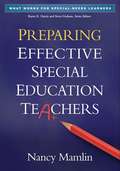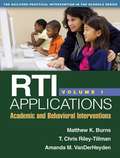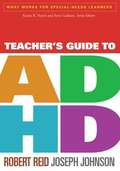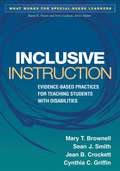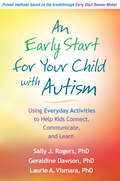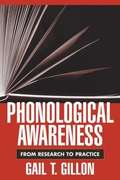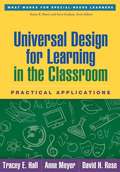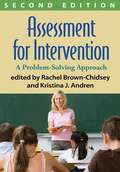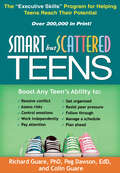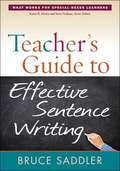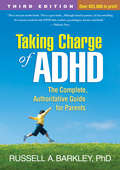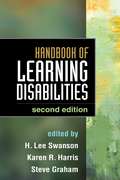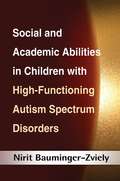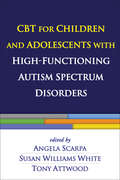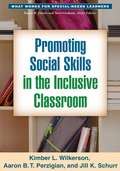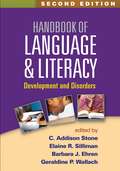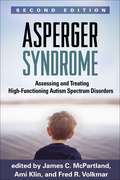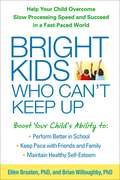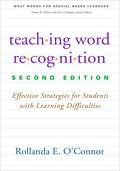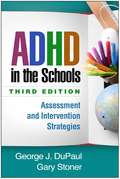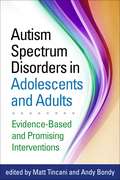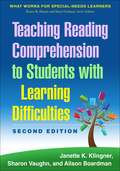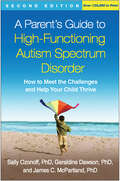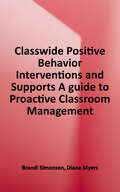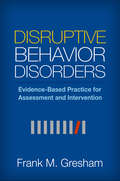- Table View
- List View
Preparing Effective Special Education Teachers
by Nancy MamlinWhat tools are in the toolkit of an excellent special educator, and how can teacher preparation programs provide these tools in the most efficient, effective way possible? This practical, clearly written book is grounded in current research and policy as well as the author's extensive experience as a teacher educator. It identifies what special education teachers need to know to work competently with students with a wide variety of learning challenges and disabilities. Chapters present specific guidelines for helping teacher candidates build critical skills for instruction and assessment, get the most out of field placements, and collaborate successfully with other school personnel and with parents.
RTI Applications, Volume 1: Academic and Behavioral Interventions (The Guilford Practical Intervention in the Schools Series #1)
by Matthew K. Burns T. Chris Riley-Tillman Amanda M. VanDerHeydenThis book addresses a crucial aspect of sustaining a response-to-intervention (RTI) framework in a school: selecting interventions with the greatest likelihood of success and implementing them with integrity. Leading RTI experts explain how to match interventions to students' proficiency levels, drawing on cutting-edge research about the stages of learning. Effective academic and behavioral interventions for all three tiers of RTI are described in step-by-step detail and illustrated with vivid case examples. In a large-size format with lay-flat binding for easy photocopying, the book features more than 40 reproducible planning tools and other helpful forms. Purchasers also get access to a Web page where they can download and print the reproducible materials.
Teacher's Guide to ADHD
by Robert Reid Joseph JohnsonMeeting a key need for teachers, this book provides practical, data-based tools for helping students with attention-deficit/hyperactivity disorder (ADHD) succeed in the classroom. The authors combine instructional expertise with extensive knowledge about the nature and treatment of ADHD. Coverage includes ways to support students and teach them needed strategies in core areas: academic skills, behavior, self-regulation, and social skills. Step-by-step instructions and concrete examples help teachers implement effective interventions and accommodations. The book also offers crucial guidance for teaming with other school professionals and with parents.
Inclusive Instruction
by Sean J. Smith Mary T. BrownellThis accessible book presents research-based strategies for supporting K-8 students with high-incidence disabilities to become accomplished learners. The authors clearly describe the core components of effective inclusive instruction, showing how to recognize and respond to individual students' needs quickly and appropriately. Teachers are provided with essential tools for managing inclusive classrooms; planning a curriculum that fosters concept development across content areas, promotes strategic learning, and builds fluent skill use; and integrating technology into instruction. Case examples illustrate ways that special and general education teachers can work together successfully to solve complex learning problems and improve outcomes for students who are struggling.
Early Start for Your Child with Autism
by Geraldine Dawson Sally J. RogersCutting-edge research reveals that parents can play a huge role in helping toddlers and preschoolers with autism spectrum disorders (ASD) connect with others and live up to their potential. This encouraging guide from the developers of a groundbreaking early intervention program provides doable, practical strategies you can use every day. Nearly all young kids-including those with ASD-have an amazing capacity to learn. Drs. Sally Rogers, Geraldine Dawson, and Laurie Vismara make it surprisingly simple to turn daily routines like breakfast or bath time into fun and rewarding learning experiences that target crucial developmental skills. Vivid examples illustrate proven techniques for promoting play, language, and engagement. Get an early start-and give your child the tools to explore and enjoy the world.
Phonological Awareness
by Gail T. GillonThis unique resource provides a comprehensive review of current knowledge about phonological awareness, together with practical guidance for helping preschoolers to adolescents acquire needed skills. Up-to-date findings are synthesized on the development of phonological awareness; its role in literacy learning; and how it can be enhanced in students at risk for reading difficulties and those with reading disorders or speech or language impairments. Of particular value to general and special educators and speech language professionals, the book's clear recommendations for assessment and intervention show how to translate the research into day-to-day teaching and clinical practice.
Universal Design for Learning in the Classroom
by Anne Meyer Tracey HallClearly written and well organized, this book shows how to apply the principles of universal design for learning (UDL) across all subject areas and grade levels. The editors and contributors describe practical ways to develop classroom goals, assessments, materials, and methods that use UDL to meet the needs of all learners. Specific teaching ideas are presented for reading, writing, science, mathematics, history, and the arts, including detailed examples and troubleshooting tips. Particular attention is given to how UDL can inform effective, innovative uses of technology in the inclusive classroom.
Assessment for Intervention
by Rachel Brown-Chidsey Kristina J. AndrenThis cutting-edge volume offers a complete primer on conducting problem-solving based assessments in school or clinical settings. Presented are an effective framework and up-to-date tools for identifying and remediating the many environmental factors that may contribute to a student's academic, emotional, or behavioral difficulties, and for improving all children's educational outcomes. Concise, consistently formatted chapters from leading researchers describe problem-solving based applications of such core assessment methods as interviews, observations, rating scales, curriculum-based measurement, functional behavioral assessment, and published tests. Including helpful case examples to demonstrate each method in action, the volume also offers invaluable tips on collaborating with teachers and school administrators, writing solution-focused psychoeducational reports, and evaluating the effectiveness of interventions.
Smart but Scattered Teens: The "Executive Skills" Program for Helping Teens Reach Their Potential
by Colin Guare Peg Dawson Richard Guare"I told you, I'll do it later." "I forgot to turn in the stupid application." "Could you drive me to school? I missed the bus again." "I can't walk the dog--I have too much homework!"If you're the parent of a "smart but scattered" teen, trying to help him or her grow into a self-sufficient, responsible adult may feel like a never-ending battle. Now you have an alternative to micromanaging, cajoling, or ineffective punishments. This positive guide provides a science-based program for promoting teens' independence by building their executive skills--the fundamental brain-based abilities needed to get organized, stay focused, and control impulses and emotions. Executive skills experts Drs. Richard Guare and Peg Dawson are joined by Colin Guare, a young adult who has successfully faced these issues himself. Learn step-by-step strategies to help your teen live up to his or her potential now and in the future--while making your relationship stronger. Helpful worksheets and forms can be downloaded and printed in a convenient 8 1/2" x 11" size. See also the authors' Smart but Scattered (with a focus on 4- to 13-year-olds) and their self-help guide for adults. Plus, Work-Smart Academic Planner: Write It Down, Get It Done, designed for middle and high school students to use in conjunction with coaching, and related titles for professionals. Winner (Third Place)--American Journal of Nursing Book of the Year Award, Consumer Health Category
Teacher's Guide to Effective Sentence Writing
by Bruce SaddlerThis practical book provides explicit instructions for teaching sentence-level skills to students who have difficulties in this area. The author explains the key role of sentence combining in the writing process and presents effective techniques for instruction and assessment. Numerous sample lessons, practice activities, planning tips, and grammatical pointers make it easy for teachers to incorporate sentence combining and construction into the writing curriculum at all grade levels (2-12). Accessible and engaging, the book helps teachers and students experiment with different ways to arrange thoughts and produce meaningful written work.
Taking Charge of ADHD, Third Edition
by Russell A. BarkleyFrom distinguished researcher/clinician Russell A. Barkley, this treasured parent resource gives you the science-based information you need about attention-deficit/hyperactivity disorder (ADHD) and its treatment. It also presents a proven eight-step behavior management plan specifically designed for 6- to 18-year-olds with ADHD. Offering encouragement, guidance, and loads of practical tips, Dr. Barkley helps you: *Make sense of your child's symptoms. *Get an accurate diagnosis. *Work with school and health care professionals to get needed support. *Learn parenting techniques that promote better behavior. *Strengthen your child's academic and social skills. *Use rewards and incentives effectively. *Restore harmony at home. Updated throughout with current research and resources, the third edition includes the latest facts about medications and about what causes (and doesn't cause) ADHD. See also Dr. Barkley's bestselling Taking Charge of Adult ADHD. Association for Behavioral and Cognitive Therapies (ABCT) Self-Help Book of Merit
Handbook of Learning Disabilities, Second Edition
by H. Lee Swanson Steve Graham Karen R. HarrisWidely regarded as the standard reference in the field, this comprehensive handbook presents state-of-the-art knowledge about the nature and classification of learning disabilities (LD), their causes, and how individuals with these difficulties can be identified and helped to succeed. Best practices are described for supporting student performance in language arts, math, and other content areas. Contributors also identify general principles of effective instruction and review issues in service delivery within response-to-intervention (RTI) frameworks. The book critically examines the concepts and methods that guide LD research and highlights important directions for future investigation. New to This Edition: *Incorporates key advances in identifying and remediating LD, with particular attention to the role of RTI. *Chapters on social cognitive, behavioral genetic, and neurobiological aspects. *Chapters on adolescents and adults with LD. *Chapters on spelling instruction, history instruction, and classroom technology applications. *Chapter synthesizing 21st-century advances in LD research methods, plus chapters on advanced statistical models, single-case designs, and meta-analysis.
Social and Academic Abilities in Children with High-Functioning Autism Spectrum Disorders
by Nirit Bauminger-ZvielyA uniquely comprehensive resource for practitioners, this research-based book addresses both the social-emotional and cognitive-academic challenges faced by children and adolescents with high-functioning autism spectrum disorders (HFASD). The author traces these kids' developmental trajectories and explores their distinct combination of strengths and needs. Effective school-based interventions for overcoming the social isolation and learning difficulties often associated with HFASD are reviewed in depth. Appendices include concise descriptions of more than 50 relevant assessment tools, plus a detailed, practical outline of the author's empirically supported social intervention model. E-book purchasers can download and print the tables from the Appendices at the companion Web page.
CBT for Children and Adolescents with High-Functioning Autism Spectrum Disorders
by Tony Attwood Susan Williams White Angela ScarpaThis book helps clinicians harness the benefits of cognitive-behavioral therapy (CBT) for children and adolescents with high-functioning autism spectrum disorders (ASD). Leading treatment developers describe promising approaches for treating common challenges faced by young people with ASD--anxiety and behavior problems, social competence issues, and adolescent concerns around sexuality and intimacy. Chapters present session-by-session overviews of each intervention program, review its evidence base, and address practical considerations in treatment. The book also discusses general issues in adapting CBT for this population and provides a helpful framework for assessment and case conceptualization informed by DSM-5.
Promoting Social Skills in the Inclusive Classroom
by Jill K. Schurr Aaron B. Perzigian Kimber L. WilkersonThis indispensable book presents evidence-based tools and strategies for improving the social skills of all members of the inclusive classroom (K-6), especially students experiencing difficulties in this area. The authors explain why social competence is critical to school success and describe interventions, curricula, and instructional approaches that have been shown to be effective at the schoolwide, classroom, and individual levels. Procedures for conducting assessments and developing individualized intervention plans are detailed. Reproducible forms can be downloaded and printed in a convenient 8 1/2" x 11" size.
Handbook of Language and Literacy, Second Edition
by C. Addison Stone Elaine R. Silliman Barbara J. Ehren Geraldine P. WallachAn acclaimed reference that fills a significant gap in the literature, this volume examines the linkages between spoken and written language development, both typical and atypical. Leading authorities address the impact of specific language-related processes on K-12 literacy learning, with attention to cognitive, neurobiological, sociocultural, and instructional issues. Approaches to achieving optimal learning outcomes with diverse students are reviewed. The volume presents research-based practices for assessing student needs and providing effective instruction in all aspects of literacy: word recognition, reading comprehension, writing, and spelling. New to This Edition *Chapters on digital literacy, disciplinary literacy, and integrative research designs. *Chapters on bilingualism, response to intervention, and English language learners. *Incorporates nearly a decade's worth of empirical and theoretical advances. *Numerous prior edition chapters have been completely rewritten.
Asperger Syndrome, Second Edition
by MD Fred R. Volkmar Ami Klin Maria Asperger Felder James C. McpartlandCompletely revised with the latest research and clinical strategies, this is the authoritative volume on Asperger syndrome (now part of DSM-5 autism spectrum disorder). Considered the definitive reference since its initial publication, the book focuses on how to assess each child or adolescent's needs and provide effective interventions in the areas of communication, behavior, and academic and vocational functioning. The neural and genetic bases of autism spectrum disorders are also explored. New to This Edition *Expanded coverage of evidence-based assessment and treatment, including two chapters on behavioral interventions. *Addresses challenges in the transition to new diagnostic criteria for autism spectrum disorder in DSM-5. *Chapters on neuropsychological advances, the transition to higher education, and forensic issues. *Many new authors and extensively revised chapters.
Bright Kids Who Can't Keep Up
by Ellen Braaten Brian WilloughbyDo you find yourself constantly asking your child to "pick up the pace"? Does he or she seem to take longer than others to get stuff done--whether completing homework, responding when spoken to, or getting dressed and ready in the morning? Drs. Ellen Braaten and Brian Willoughby have worked with thousands of kids and teens who struggle with an area of cognitive functioning called "processing speed," and who are often mislabeled as lazy or unmotivated. Filled with vivid stories and examples, this crucial resource demystifies processing speed and shows how to help kids (ages 5 to 18) catch up in this key area of development. Helpful practical tools can be downloaded and printed in a convenient 8 1/2" x 11" size. Learn how to obtain needed support at school, what to expect from a professional evaluation, and how you can make daily routines more efficient--while promoting your child's social and emotional well-being.
Teaching Word Recognition, Second Edition: Effective Strategies for Students with Learning Difficulties (What Works for Special-Needs Learners)
by Rollanda E. O'ConnorThis highly regarded teacher resource synthesizes the research base on word recognition and translates it into step-by-step instructional strategies, with special attention to students who are struggling. Chapters follow the stages through which students progress as they work toward skilled reading of words. Presented are practical, evidence-based techniques and activities that target letter- sound pairings, decoding and blending, sight words, multisyllabic words, and fluency. Ideal for use in primary-grade classrooms, the book also offers specific guidance for working with older children who are having difficulties. Reproducible assessment tools and word lists can be downloaded and printed in a convenient 8 1/2" x 11" size. New to This Edition *Incorporates the latest research on word recognition and its connections to vocabulary, reading fluency, and comprehension. *Chapter on morphological (meaning-based) instruction. *Chapter on English language learners. *Instructive "Try This" activities at the end of each chapter for teacher study groups and professional development.
ADHD in the Schools, Third Edition: Assessment and Intervention Strategies
by George J. Dupaul Gary Stoner Robert ReidThis highly regarded practitioner guide provides state-of-the-art tools for supporting the academic and behavioral success of PreK-12 students with attention-deficit/hyperactivity disorder (ADHD). The authors explain the learning and behavior difficulties associated with ADHD and describe screening and assessment procedures that facilitate data-based decision making. They show how to develop individualized intervention plans that integrate behavioral, academic, and social supports, in partnership with teachers and parents. Strategies for collaborating with physicians and monitoring students' medication response are also presented. Helpful reproducible forms and handouts can be downloaded and printed in a convenient 8 1/2" x 11" size. New to This Edition: *Reflects a decade's worth of research and clinical advances, plus the growth of multi-tiered service delivery models. *Discusses changes in DSM-5. *Separate chapter on interventions for middle and high school students, with new content on the transition to college. *Updated medication information, case examples, and more.
Autism Spectrum Disorders in Adolescents and Adults
by Andy Bondy Matt TincaniBringing together leading experts, this book presents effective practices for helping people with autism spectrum disorders (ASD) to thrive in adulthood. As individuals with ASD mature, their needs change as well. The book reviews the growing research base and describes ways to support adolescents and adults in succeeding in higher education and work, living independently, enjoying leisure activities, navigating meaningful personal relationships, and more. Specific behavioral and instructional interventions--such as functional communication training, positive behavior support, and applied behavior analysis--are discussed. Case examples illustrate practical aspects of applying the strategies in real-world school and community settings.
Teaching Reading Comprehension to Students with Learning Difficulties, 2/E
by Alison Boardman Sharon Vaughn Janette K. KlingnerThis practitioner resource and course text has given thousands of K-12 teachers evidence-based tools for helping students--particularly those at risk for reading difficulties--understand and acquire new knowledge from text. The authors present a range of scientifically validated instructional techniques and activities, complete with helpful classroom examples and sample lessons. The book describes ways to assess comprehension, build the skills that good readers rely on, and teach students to use multiple comprehension strategies flexibly and effectively. Each chapter features thought-provoking discussion questions. Reproducible lesson plans and graphic organizers can be downloaded and printed in a convenient 8 1/2" x 11" size. New to This Edition *Chapters on content-area literacy, English language learners, and intensive interventions. *Incorporates current research on each component of reading comprehension. *Discusses ways to align instruction with the Common Core State Standards. *Additional instructional activities throughout.
Parent's Guide to High-Functioning Autism Spectrum Disorder, Second Edition: How to Meet the Challenges and Help Your Child Thrive
by Sally Ozonoff Geraldine Dawson James C. McpartlandMany tens of thousands of parents have found the facts they need about high-functioning autism spectrum disorder (ASD), including Asperger syndrome, in this indispensable guide. Leading experts show how you can work with your child's unique impairments--and harness his or her capabilities. Vivid stories and real-world examples illustrate ways to help kids with ASD relate more comfortably to peers, learn the rules of appropriate behavior, and succeed in school. You'll learn how ASD is diagnosed and what treatments and educational supports really work. Updated with the latest research and resources, the second edition clearly explains the implications of the DSM-5 diagnostic changes.
Classwide Positive Behavior Interventions and Supports: A Guide to Proactive Classroom Management (Guilford Practical Intervention in the Schools)
by Brandi Simonsen Diane MyersA vital classroom management resource, this book shows how to implement positive behavior interventions and supports (PBIS) in K-12 classrooms, regardless of whether PBIS is adopted school-wide. <p><p>The primary focus is universal (Tier 1) support for all students. Practical, step-by-step guidelines are provided for structuring the classroom environment, actively engaging students in instruction, teaching positive expectations, and establishing a continuum of strategies to reinforce positive behavior and respond to inappropriate behavior. <p><p>Numerous real-world examples and learning exercises are included. In a convenient large-size format, the book includes reproducible tools for class-wide PBIS planning and implementation, which can be downloaded and printed for repeated use.
Disruptive Behavior Disorders
by Frank M. GreshamSchools often resort to ineffective, punitive interventions for the 10% of K-8 students whose challenging behavior interferes with their own and their classmates' learning. This book fills a crucial need by describing ways to provide meaningful supports to students with disruptive behavior disorders. Prominent authority Frank M. Gresham weaves together current research, assessment and intervention guidelines, and illustrative case studies. He reviews a broad range of evidence-based practices and offers recommendations for selecting, implementing, and evaluating them within a multi-tiered framework. Coverage includes school- and home-based approaches, multicomponent programs, prevention strategies, and social skills training.
